
Ali Miraj 12pm - 3pm
28 October 2023, 07:10 | Updated: 28 October 2023, 15:14
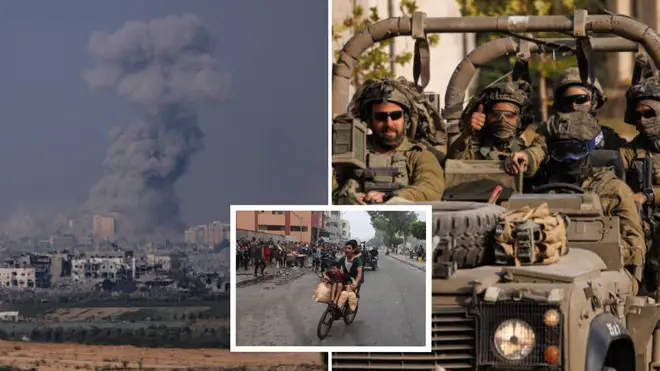
Israel has urged any civilians remaining in northern Gaza to move to the south of the territory, as it warned of an "impending" period of "intense hostilities".
Israeli forces moved into the strip on Friday evening amid support from huge airstrikes and naval operations. Unlike previous, smaller incursions, the forces remained in Gaza on Saturday morning.
Hamas said there had been fighting around Beit Hanoun, near the north-eastern corner of the territory, and in Bureji, to the south of Gaza City.
The bombardment against Gaza also ramped up on Friday night, and communication lines to the strip were cut, leaving it without power and internet. The massive bombing operation continued on Saturday morning.
Hamas said on Saturday afternoon that 7,650 people in Gaza had been killed since the start of the conflict with Israel. Israel said 1,400 people were killed by Hamas in the attacks that began the conflict on October 7. These numbers have not been verified independently.
Israel told all Palestinians at about 1.30 pm UK time to leave northern Gaza if they had not already done so, because of "intense hostilities" to come.
An urgent message for the residents of Gaza: pic.twitter.com/GAW3a7lWt8
— Israel Defense Forces (@IDF) October 28, 2023
IDF spokesman Daniel Hagari said in a video address aimed at Gaza residents: "For your immediate safety, we urge all residents of northern Gaza and Gaza City to temporarily relocate south."
He added: "Moving back to northern Gaza will be possible once the intense hostilities end."
Mr Hagari said that Hamas was endangering civilians in danger by putting its forces in places like hospitals, schools and mosques.
He said: "The impending IDF operation is set to neutralise the threat of Hamas with precision and intensity."
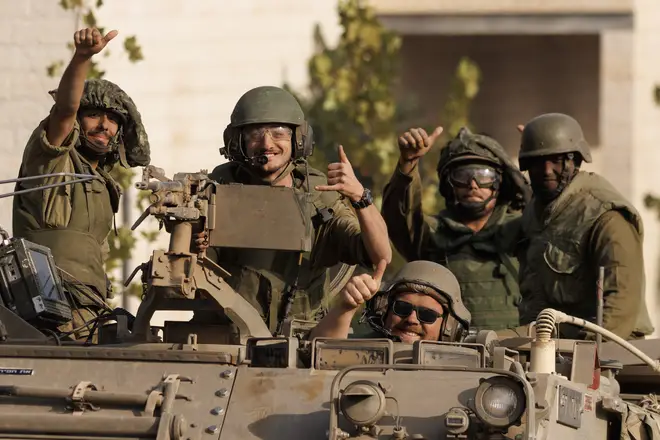
Mr Hagari added: "Your window to act is closing, move south for your own safety.This is not a mere precaution, this is an urgent plea for the safety of the civilians in Gaza."
Israel has been telling Gaza residents to move south for weeks, but the southern parts of the territory are still being bombed, albeit at a lower rate than the north.
Photos from the southern city of Khan Younis showed bombed out buildings, although it is unclear how many were destroyed on Friday and Saturday.
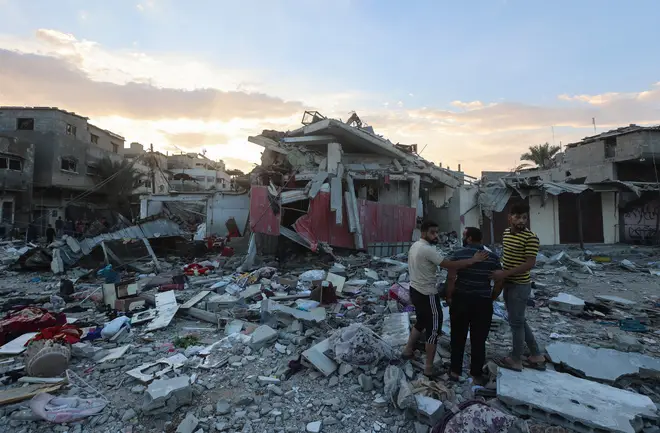
And there are huge problems with overcrowding in the south, including a lack of food and water for many. Humanitarian aid has been coming in via Egypt in recent days, but charity workers say it is not enough.
Some politicians in the UK, including London's Labour mayor Sadiq Khan, have called for a ceasefire to end civilian deaths. But Foreign Secretary James Cleverly said on Saturday that Hamas has shown no sign it "desires or would abide by calls for a ceasefire".
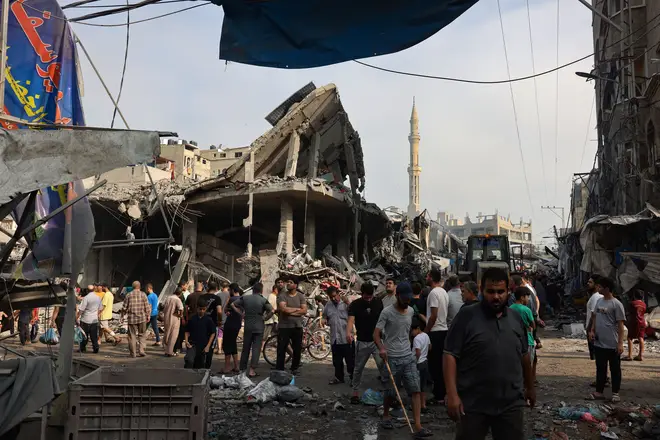
The expanded operation in Gaza came after Israel's war cabinet overcame a disagreement about military strategy in the territory, as talks with Hamas over the release of hostages were said to have broken down.
Benjamin Netanyahu had previously resisted calls for a ground invasion of the strip, which angered senior members of the military as Western leaders started to call for a ceasefire, the Telegraph reported.
Israel said on Saturday morning that it had killed Hamas' head of aerial operations - who planned the hang-glider raid as part of the October 7 attacks.
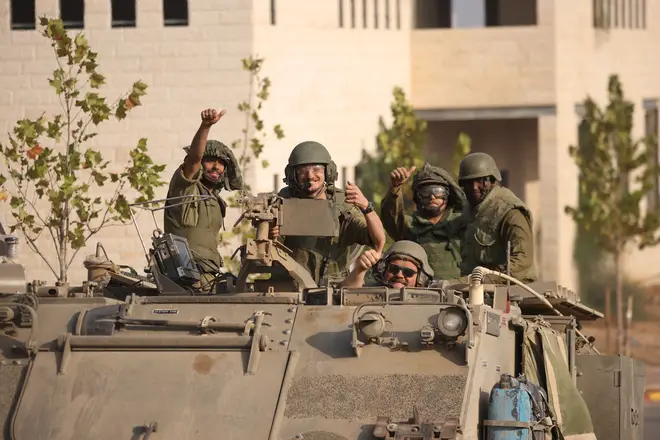
The IDF said: "Overnight, IDF fighter jets struck Asem Abu Rakaba, the Head of Hamas' Aerial Array.
"Abu Rakaba was responsible for Hamas' UAVs [unmanned aerial vehicles], drones, paragliders, aerial detection and defence.
"He took part in planning the October 7 massacre and commanded the terrorists who infiltrated Israel on paragliders and was responsible for the drone attacks on IDF posts."
The army also said on Saturday that overnight it had hit 150 underground targets, which it called "terror tunnels, underground combat spaces and additional infrastructure."
Gaza has been left reeling by the bombing. A BBC reporter in the territory said there was a "state of panic, fear and chaos" among residents.
Meanwhile families of the hostages held by Hamas voiced their concerns about the safety of their loved ones amid the massive bombardment overnight.
They said in a statement: "This night was the most terrible of all nights. It was a long and sleepless night, against the backdrop of the major IDF operation in the Strip, and absolute uncertainty regarding the fate of the hostages held there, who were also subject to the heavy bombings.
They added: "The families are worried about the fate of their loved ones and are waiting for an explanation. Every minute feels like an eternity."
The UK's position has been to call for pauses in the fighting to let in humanitarian aid into Gaza - but not a ceasefire.
But as some Labour politicians, including Mr Khan, have said that fighting should stop, Mr Cleverly said: "We have consistently sought to bring about pauses to facilitate the inward passage of humanitarian aid that we are providing and the release of hostages and the evacuation of British nationals in Gaza, so that has been our position from the start.
"Of course we want to see this resolved, we want to see Israel safe, peaceful and secure.
"But, as yet, I have seen or heard nothing from Hamas that gives me any confidence that they desire or would abide by calls for a ceasefire."
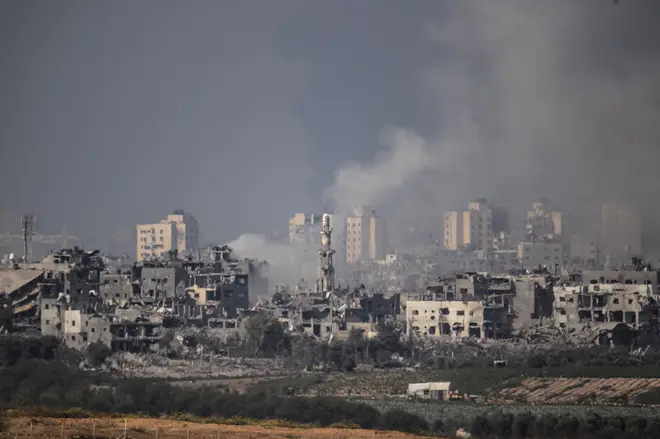
IDF spokesman Mr Hagari said earlier that Israel "will continue to make a concerted effort in order to maintain the security of our forces, using strong fire from the air, but this is combat.
"We are working towards goals that we have set for ourselves and that have been defined for us. The dissolution of Hamas, border security and a national effort to return the abducted."
He added that more trucks carrying food, medicine and water would enter southern Gaza.
"Anybody in that area, which is a safe and protected area, will receive [them]."
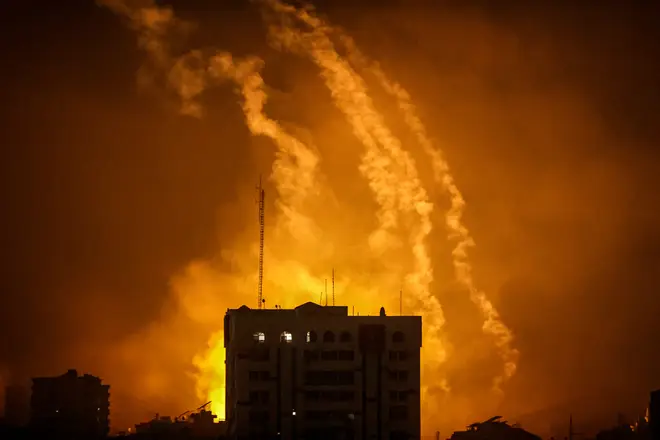
It comes after Mr Hagari said in an update on Friday evening that the military is "prepared on all fronts".
The IDF has previously launched raids into the territory, with a second armoured night incursion taking place on Thursday. The IDF also said it had launched an attack from the sea using commandos in a brief attack.
Mr Hagari said on Friday evening: "In addition to the attacks carried out in the last few days, ground forces are expanding their operations tonight.
"The IDF is operating at all dimensions."
He added: "In recent hours we have increased the attacks in Gaza. The air force widely attacks underground targets and terrorist infrastructure, very significantly."

Air Vice-Marshal Sean Bell on why it will be difficult to 'obliterate Hamas'
Israel’s intensified bombardment of the area came not long after it had accused Hamas of using the Al-Shifa hospital in Gaza as a shield for the group’s command structure.
But Israel may not ever be able to take out Hamas entirely, a former top RAF officer told LBC on Saturday.
Air Vice-Marshal Sean Bell said: "While 'Obliterate Hamas' makes a great soundbite for the media, it actually isn't a very achievable objective, not least of which you can take out most of Hamas' infrastructure, some of its leadership, maybe some of its weapons supplies, but as to its fighters, they will just blend away into the Palestinian population.
"It's almost certain that that is not a an achievable objective."
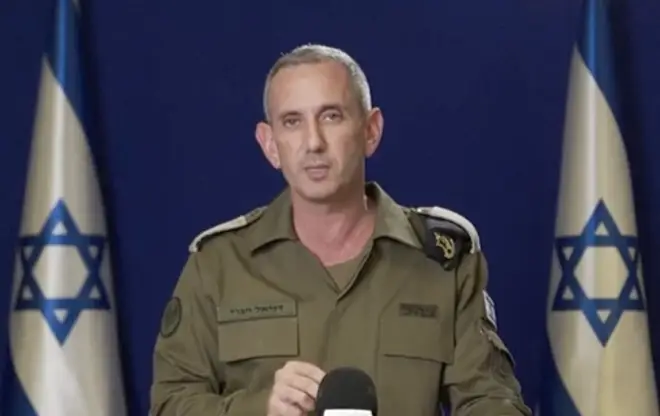
On Friday evening, the US said it would back humanitarian pauses in Gaza to allow aid to reach the region.
National security advisor for the White House, John Kirby, also said the US would support a “localised, temporary pause” in fighting if it would mean getting hostages out of the strip.
While UK Foreign Secretary said after the expanding operation was announced: "Israel is expanding their military campaign against Hamas.
"The UK’s top priority remains the safety of British nationals in Gaza and the region.
"We support Israel’s right to self defence, in line with IHL, and continue to push for the protection of Palestinian civilians."
The IDF has called up hundreds of thousands of reservists, who appear to have been massing at the border with Gaza in the three weeks since the Hamas massacre.
Israel has been pummelling the strip with air strikes for weeks after the Hamas killings.
The attacks have led to fears of a humanitarian catastrophe as other countries plead with Israel to ensure aid can get into the strip.
Following Israel’s announcement the UN General Assembly announced on Friday it had voted in favour, by an overwhelming majority, for an immediate truce in Gaza - although this is not legally binding.
The vote also includes the condemnation of all “terror and indiscriminate attacks” and the “immediate and unconditional release” of all hostages.
Israeli ambassador Gilad Erdan hit out at the UN’s vote for a truce, as he said: “Today is a day that will go down as infamy. We have all witnessed that the UN no longer holds even one ounce of legitimacy or relevance.
“Israel will continue to defend itself. We will defend our future, our very existence by ridding the world of Hamas’s evil so that it can never threaten anyone else again.”
Hopes remain that Hamas will allow the roughly 220 hostages to go with help from Qatari and Egyptian negotiators. Blue and white balloons were released in cities across the world, with each balloon symbolising one hostage.
The Israeli government has pledged to degrade Hamas, with Benjamin Netanyahu this week vowing that all their fighters are "doomed".
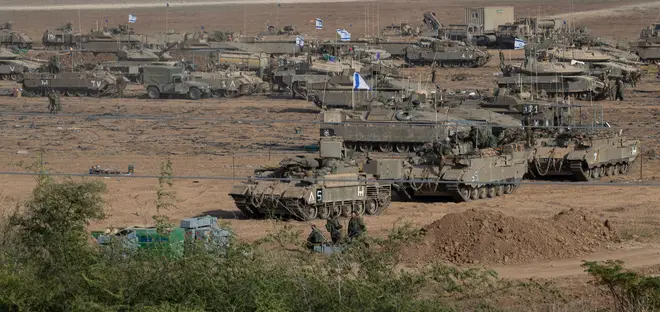
Troops and tanks launched a small raid into northern Gaza on Thursday night, striking several Hamas targets in order to "prepare the battlefield" ahead of the expected ground invasion.
The raid came after the UN warned it is on the verge of running out of fuel in the Gaza Strip.
Tanks backed by fighter jets, helicopters and drones crossed over the border, wiping out Hamas targets and infrastructure, the Israeli Defence Forces said.
The raid took place near the Shuja'iyya neighbourhood.
The IDF said it had previously launched limited forays into Gaza to try and secure hostages.
The conflict has ignited community tensions across the world.
In the UK, Labour politicians have begun calling for a ceasefire, despite Sir Keir Starmer simply calling for pauses to allow aid in.
London's mayor Sadiq Khan, Greater Manchester mayor Andy Burnham and Scottish Labour leader Anas Sarwar have all called for an end to the violence.